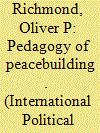|
|
|
Sort Order |
|
|
|
Items / Page
|
|
|
|
|
|
|
| Srl | Item |
| 1 |
ID:
114109


|
|
|
|
|
| Publication |
2012.
|
| Summary/Abstract |
A post-liberal peace engages with the politics of hybridity emerging from a mixture of contextual and international social, political, economic, cultural, and historical dynamics of peace. It represents an attempt to escape liberal enclosure and distant administration as well as contextual forms of violence in post-conflict zones-from Bosnia Herzegovina to Afghanistan. Critical agency as a form of resistance aimed at liberation from the structures of conflict, and structural violence-wherever they lie-rather than solely relying on external norms and capacity, is key. From this tension, a range of "local," transversal, and transnational agencies can be uncovered in many peacebuilding or statebuilding contexts, which may resist, modify, or co-opt intervention in unexpected ways. A hybrid form of peace emerges from this agonistic process, which points to an understanding of peacebuilding-as-liberation. Rather than producing subjects, this enables subjects to produce peace.
|
|
|
|
|
|
|
|
|
|
|
|
|
|
|
|
| 2 |
ID:
087719


|
|
|
|
|
| Publication |
2009.
|
| Summary/Abstract |
As post-military 'democratic' regimes across Africa perpetuate norms and practices that were characteristic of the previous openly authoritarian era, humour and ridicule have emerged as a means through which ordinary people attempt to deconstruct and construct meaning out of a reality that is decidedly surreal. In Nigeria jokes serve a double function as a tool for subordinate classes to deride the state (including its agents) and themselves. Jokes are therefore a means through which an emergent civil society, 'behaving badly', subverts, deconstructs, and engages with the state. Yet, for all its significance as a form of agency, humour has been neglected in the civil society literature, partly because of the mentality which frames civil society in terms of organizations (humour is not organized), and partly because of its almost exclusive attention to the 'civil' attributes of civil society (humour is, inter alia, rude). This article argues for incorporating humour into the civil society discourse, and suggests that doing so will enrich civil society analysis by focusing on both the constructions of sociality and their associated politics, and the hidden spaces in which most of visible political action originates.
|
|
|
|
|
|
|
|
|
|
|
|
|
|
|
|
|
|
|
|
|